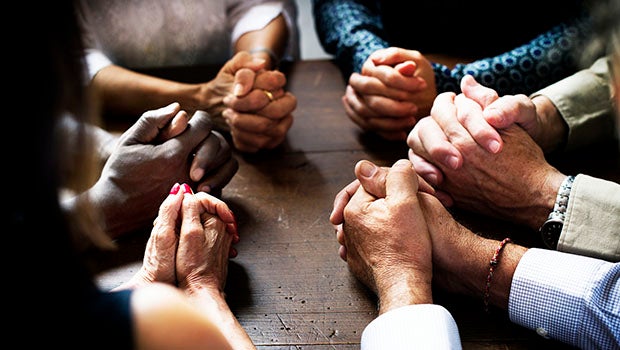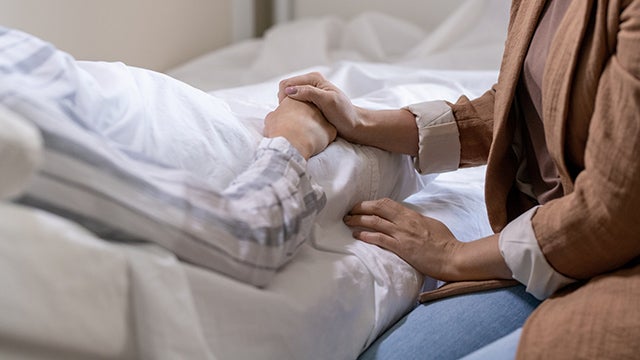Imagine if teachers never reviewed the projects they assigned to students. Or if a company provided staff training but had no plans to gauge if participants gained knowledge. How would they know they’re making a difference?
Evaluation is key to most aspects of learning and life. And measuring religious literacy is no different.
“There are these great big ideas about what religious literacy can accomplish. But some are on the level of societal change,” said Dr. Kate E. Soules, the Religion & Society Program’s new Fellow for Religious Literacy Evaluation. “I’m pretty sure your two-day seminar isn’t going to have an outcome of global tolerance.”
For Soules, who is also a member of the Religious Literacy cohort of the Powering Pluralism Network, her work is focused on being realistic about what you’re doing and what you can actually assess. “Are we actually measuring outcomes?” she asks. “Do we have any evidence to say this program works?”
After graduating from Wellesley College with a minor in religious studies, Soules went on to earn her Master of Theological Studies from Boston University and her Doctor of Philosophy in Curriculum & Instruction from Boston College. Those classes taught her the value of research and data.
“My Ph.D. was an empirical research-focused degree,” she explained. “There was always some sort of discussion about assessment and outcomes.”
However, Soules finds many working in the religious literacy space come from the humanities, where data might be less of a focus. Religious literacy is a key component of the Religion & Society Program’s work. The team describes it as “having a basic understanding of religions (including texts, practices, and beliefs) and how religions are shaped by cultural contexts.” This allows people of all faiths and those with no faith to engage more effectively and find common values that will foster community, understanding, and respect for their differences.
An example of religious literacy initiatives includes Harvard’s Religion and Public Life program, which is training teachers on how to address religious contexts in their classrooms. This is the very place where Soules got her start.
An AmeriCorps fellowship following college led to a job teaching world religion to eighth graders at a Dorchester, Massachusetts all-girls middle school. Soules was a first-year teacher with very limited training, though she had written her senior thesis on religion content in social studies textbooks.
“They gave me a binder of miscellaneous handouts, those old transparency sheets, and a 12th-grade level textbook,” she said.
While Soules was thrown into the teaching world, it was something she realized she loved, especially when she saw how much her students cared about what they were learning.
Recalling a day when after visiting a nearby Islamic Center, one of her students noted that they saw a Muslim woman on the local T and made a connection to what they learned on the recent field trip. “They’re the oldest in the school and they’re becoming more independent thinkers, but they’re still young enough to not be super prejudiced, despite being in this really small school and not necessarily exposed to a ton of other things,” she said. “I don’t expect those kids to remember all the dates and names and holidays and deities that we studied, but if something they see in school or in their daily life registers as something we talked about or they learned, that’s a good thing,”
That recognition of others, in a positive-aware way, is important.
Soules defined religious pluralism as having people from multiple religious traditions and backgrounds, including non-religious traditions and backgrounds, actively working together to live in communities and understand one another.
“It’s not just the existence of religious diversity, which isn’t enough; but, recognizing that you need to know about other people. It doesn’t require everybody engaging in interfaith dialogue or people joining intentional communities that bring together people from different religions,” Soules said. “But the recognition that we need to be aware of other people’s religious identities that those people are part of my community—and that they’re a valuable part of my community.”
Today, Soules is the director of the Religion & Education Collaborative, an education researcher, and curriculum developer specializing in religious literacy and teacher education. Her work ranges from developing college-level courses on religious freedom to curriculum development on world religions.
The tools Soules will produce during her fellowship are geared towards anyone engaged in the religious literacy conversation, not just those in the education space. Ideally, that would include anyone from the Program’s Powering Pluralism Network who is planning these types of programs. Her research aims to provide guidelines on how to include evaluation as part of the planning of any project, and she points out that metrics are important from a funding aspect too.
“Funders want to know that you’re going to be able to produce results,” Soules said. “If your program can’t give any evidence beyond, ‘we had a hundred people show up’ they might not keep supporting your work.”
“I would like to see more people thinking about evaluation as part of their planning and part of their programming. So, when they discuss their programs, they’re talking in terms of concrete objectives and outcomes and not just wanting people to come away with a greater appreciation for religious diversity,” she said.


